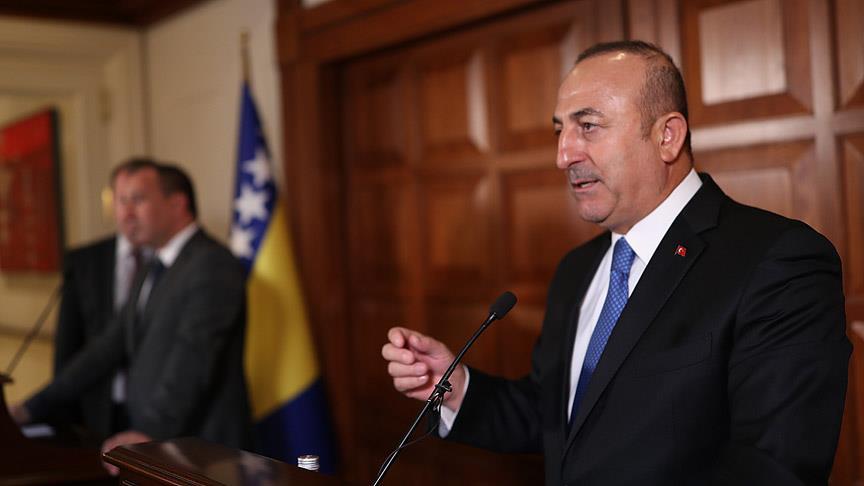Turkey upset at US for backing PKK-linked group
Foreign Minister Mevlut Cavuosoglu says it is 'not right' for US to arm Syrian YPG

By Diyar Guldogan
ANKARA
Foreign Minister Mevlut Cavusoglu said Tuesday it was “not right” for the U.S. to arm the YPG terrorist organization.
Speaking at a news conference in the Turkish capital alongside his Bosnian counterpart Igor Crnadak, Cavusoglu said:
"The U.S. said it did not give weapons to the YPG...We captured some of these guns in the hands of the PKK in Turkey.
“There is no distinction between the PKK and YPG. That is why it is not right for the U.S. to give weapons to such a terrorist organization."
He added Turkey knew the U.S. was arming the YPG. Cavusoglu said Chief of General Staff Hulusi Akar, Turkey’s top military figure, told U.S. General Joseph Dunford during an Ankara visit on Sunday not to supply weapons to the terror group.
Cavusoglu said, at Akar’s suggestion, a high-ranking American officer would be stationed at the U.S. embassy for dialogue and cooperation between the two countries' militaries.
The foreign minister also commented on the operation to take the Syrian city of Raqqah from Daesh, saying Turkey's strategy was "certain".
Ankara is opposed to the involvement of the PKK terror group’s affiliates such as the PYD and its military wing, the YPG, in the operation.
"We try to explain to everyone, especially the U.S., that it is wrong to go Raqqah with the wrong groups and with other terrorist organizations," Cavusoglu said.
Cavusoglu added the U.S said the YPG would be involved in a "siege" of Raqqah but would “certainly” not enter the city, stating it could increase support for Daesh from inhabitants.
"We should not have people make a choice between two devils," he added.
Bashiqa
Regarding Iraq’s northern Daesh-held town of Bashiqa, Cavusoglu said he reiterated Turkey’s support for Iraq's territorial integrity, security and stability.
Turkey has a longstanding military training mission at the nearby Camp Bashiqa, where Turkish soldiers have trained both Peshmerga fighters and local tribal volunteers in combat techniques.
In recent months, the mission’s presence in northern Iraq has led to a degree of tension between Baghdad and Ankara amid calls by some Iraqi lawmakers for Turkish troops to withdraw from the area.
"We want to solve this issue, which was needlessly escalated, through diplomatic ways," Cavusoglu said.
Last month, the Iraqi army -- backed by U.S.-led coalition airstrikes -- launched a wide-ranging operation aimed at retaking Mosul, Daesh’s last bastion in northern Iraq.
Cavusoglu said Turkey took precautions near its border, adding the country would take further steps "without hesitation" if threatened.
Bilateral relations
Cavusoglu thanked Bosnia and Herzegovina for its support after Turkey’s defeated July 15 coup attempt, which martyred 246 people and wounded 2,194 others.
He said the coup plot was not a threat to Turkey alone. "Bosnia and Herzegovina is also a target country for them," Cavusoglu said, referring to the Fetullah Terrorist Organization (FETO).
Crnadak said: "Bosnia took up its clear position that night and showed its support for Turkey."
Led by U.S.-based Fetullah Gulen, FETO is accused of orchestrating Turkey’s coup plot as well as being behind a long-running campaign to overthrow the state through the infiltration of institutions, particularly the military, police and judiciary.
Cavusoglu said bilateral trade volume with Bosnia was worth $540 million, adding the countries wanted to raise this sum to $1 billion.
President Recep Tayyip Erdogan will later receive Crnadak at the Presidential palace.
Anadolu Agency website contains only a portion of the news stories offered to subscribers in the AA News Broadcasting System (HAS), and in summarized form. Please contact us for subscription options.







